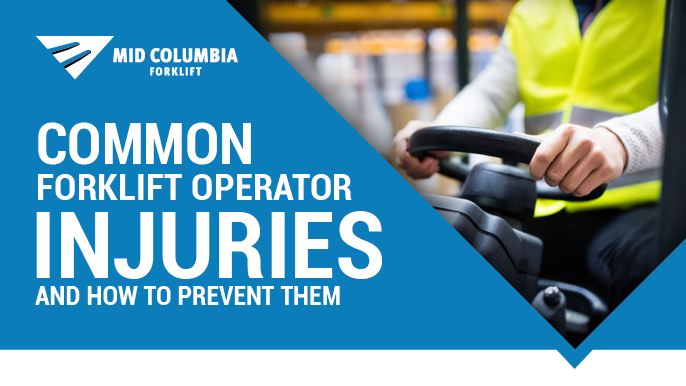Common Forklift Operator Injuries and How to Prevent Them
by Dan Livingston, on March 4, 2024 at 12:37 PM

June is forklift safety month, so it's the perfect time to review:
- The most common forklift-related injuries
- The main cause of forklift injuries
- How to prevent forklift-related incidents
How to Reduce Forklift Operator Injuries
Forklifts are involved in more than 24,000 warehouse accidents each year, but accidents aren’t the only source of forklift operator injuries. Thousands of operations take a productivity hit each year when operators miss work due to musculoskeletal and repetitive strain injuries. Some issues result in a workers’ comp. claim.
Operators learn how to avoid injuries during their forklift certification course, but fatigue or a high-stress work environment can put best practices on the back burner. Here are a few simple ways facility managers and fleet managers can support driver safety and prevent injuries:
- Provide safety training to operators and pedestrians
- Replace the operator’s seat every three years
- Provide an anti-vibration seat cushion
- Install a back-up handle on each forklift
- Encourage drivers to stretch (before and after their shift and during breaks)
- Give drivers sturdy gloves (to prevent pinched fingers)
- Require hard hats
- Keep floors free of debris
Each of the suggestions above is a proven way to prevent one or more common forklift operator injuries. Read on to learn more about each of these suggestions.
Common Forklift Operator Injuries
Head Injuries - Falling objects injure many operators (and bystanders) each year. The forklift's overhead guard provides some protection, but most aren’t designed to protect the operator from heavy objects. A hard hat, and training on how to properly secure a load, can help drivers and other staff members avoid head injuries.
Chronic Pain - Repetitive movements, sitting for long periods and vehicle vibration take their toll on the human body. Many forklift operators end up with lower back pain, musculoskeletal and other repetitive strain injuries.
Ergonomic features such as a swiveling seat, rear handle grip with horn and regular stretching can keep minor discomfort from becoming a lifelong problem. It's also a good idea to replace the forklift seat every 2-3 years.
Whiplash - This injury typically occurs when a driver is going too fast and brakes suddenly to avoid a collision. It can also occur when a pedestrian suddenly steps out in front of the truck. Safety training for operators and pedestrians is key to preventing whiplash, an all-too-common injury.
Serious Bodily Injury - Forklift tipovers and overturns cause hundreds of hospitalizations each year. Serious injury occurs when the operator is suddenly ejected from the forklift or crushed by the vehicle or its load. Head injuries and muscle sprains are the "best" outcome; dozens of people die this way each year.
Some of the major causes of tipovers and overturns include:
- An unbalanced load
- Debris in the forklift’s path
- The driver ignores or doesn’t understand the forklift’s capacity chart
Proper Training Prevents Accidents Period.
Forklift injuries can be sudden and severe, or they can be repetitive use issues that spiral into long-term problems, but most can be avoided. OSHA estimates proper forklift training could decrease the likelihood of injuries while using forklifts by 70%. That's inexpensive insurance against serious fines — and other things that are much worse.
Failure to provide proper training — including training for contract and temporary workers — can result in an OSHA fine of $161,000 or more. This is in addition to any expenses caused by the accident itself (legal fees, equipment damage, etc.) and damage to morale.
According to the BLS (Bureau of Labor Statistics), the following industries have the highest number of forklift-related injuries:
- 31% Transportation and Warehousing
- 28% Manufacturing
- 17% Wholesalers
We offer remote and on-site OSHA forklift training for new operators and refresher training for certified forklift operators. To schedule training or learn more about the ergonomic equipment described above, contact a safety expert at Mid Columbia Forklift and MidCo Material Handling.
Connect with us online or by phone:
Auburn 253-854-5438
Pasco 509-547-7413
Wenatchee 509-663-9009
Yakima 509-457-5137
Further Reading:
4 Simple Ways to Prevent Loading Dock Accidents
5 Forklift Operator Bad Habits It's Time to Break
The Ergonomic Benefits of Stand-Up Forklifts




